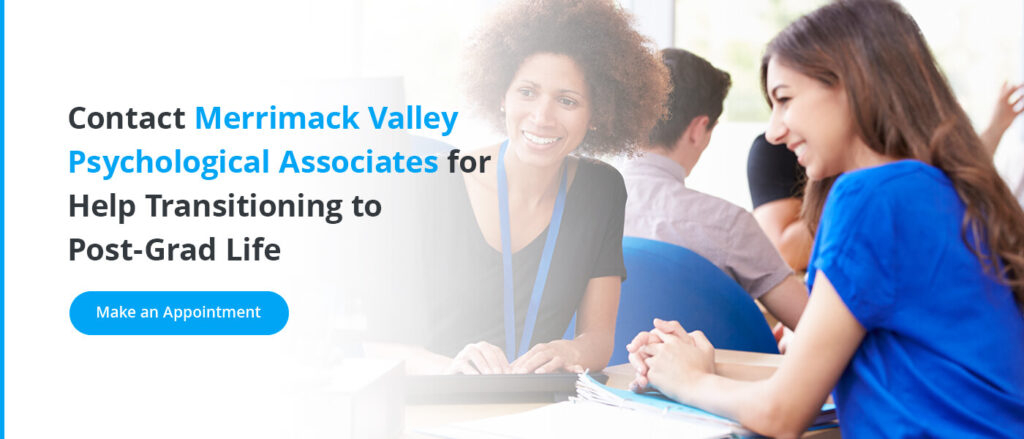Over 4 million college students graduated in 2021. Many were left wondering what to do after their time in college ended. Even when students take advantage of their schools’ post-grad programs, it can still be difficult to step into a career — and life as a “real” adult — after so many years of attending school.
There’s no clear guide telling you what you should do next, so it’s normal to feel lost or overwhelmed. Below, we’ll guide you through some of the options you have and tips to navigate the post-grad transition.
I’m Graduating College… What’s Next?
If you’re a recent college graduate or nearing your graduation date, you could be at a loss for what you should do next. Maybe you’re thinking about getting a job, attending grad school, or traveling abroad — or you have no clue what’s in store for the next chapter of your life.
There’s no right answer — what you choose to do after college is up to you and dependent on your situation. Consider each of your options carefully and consider how they impact your future career and current passions so you can make the correct choice for you.
8 Things to Do During Post-Grad
If you’re trying to figure out what to do after college, you have options. Fortunately, navigating post-grad doesn’t have to be challenging, so whether you’re a new grad or your child is going to graduate soon, you can create a solid plan. Take a look at some of the options below, keeping your career path and passions in mind:
- Move back home: Some people decide to move back home once they’ve graduated college. This idea can grant you an excellent opportunity to explore your options in a safe, comfortable, and cost-effective environment. While at home, you can network with professionals in your field, take time to update your resume, and connect with other alumni from your college.
- Continue your education: The job you want after graduation might require additional education or certification. Consider attending grad school or trade school and taking classes that will prepare you for your desired field. If you’ve changed your mind about your career path, which is completely normal, you could take classes at your local community college to make your new dream a reality.
- Become a research assistant: Most colleges and universities conduct research and constantly hire new graduates as research assistants, where they can gain additional knowledge in their fields and connect with various professionals. Almost every field performs some kind of research, so you’ll likely be able to find a position whether you majored in science or communications. Contact your college professors and look at other colleges in your area to determine whether any research assistant positions are available for recent graduates.
- Find an internship: Taking an internship allows you to get experience for your resume, obtain recommendation letters, and network with people in your field. Some internships can even turn into full-time positions. If you’re looking to take on an internship, do some research before you graduate so you can start once you’ve finished school. Your professors might be able to point you in the direction of an internship that can help you get your foot in the door in your desired career field.
- Volunteer in your community: You might not find a job in your chosen field right out of college, and that’s OK. While working somewhere else, you can volunteer for an organization that caters to your field. As a volunteer, you’ll be able to hone new skills, network with other professionals and provide a valuable service as you give back to your community. Some volunteer opportunities can even turn into full-time positions when you network and demonstrate your skills.
- Take a government position: There are numerous opportunities to work for the government on a local, state, or federal level. Take a look at government job boards online to see whether you could use your degree to work in the public sector. These jobs can range from working in administration for the Federal Department of Agriculture to becoming a park ranger at Yosemite National Park. Working in a government position allows you to network with qualified professionals and build your resume with skillful experience, which will be useful as you work toward your career.
- Take an online certification or course: When you’re exploring your options in post-grad, you might find that you can hone in on developing skills that will better serve you when you start your job hunt. There are many low-cost online courses where you can enhance certain skills that are relevant to your career. You can also look for certifications in fields that interest you, such as social media marketing, where you’ll learn all the skills you need to get started applying for social media management positions.
- Start networking: One of the most valuable skills you can hone is your ability to connect with others. In many fields, it really is about who you know. By networking with people in your field, more career opportunities will become available to you and you might be able to climb the ladder more quickly. Start by reaching out to your professors and building your connections with them. They can help you establish relationships with other professionals in your field in the future.
The Transition to Post-Grad for Recent College Graduates
Unfortunately, media and society often portray post-grad in a romanticized manner, but the reality is usually different. There’s an idea that success comes immediately after college and our 20s are meant to be the best time of our lives.
However, it can be challenging to adjust to independent living — you may have to live on your own for the first time, working a full-time job to pay your bills. If you’re moving to a new place to start your career, being alone in a new location can add even more stress to the situation as you work to create new friendships.
For some new grads, the suddenness of leaving school behind can be a tough situation to deal with on its own. After all, you’ve likely been in school since you were a toddler — over a decade and a half later, you may have to adjust to a life where you have more responsibilities than just attending class.
Fortunately, post-grad life is a process, not a swift change. Therefore, you can take slow steps as you figure out how you want to shape your future. The best part is that your 20s are an ideal time to try new things, so just because one approach doesn’t work for you doesn’t mean you can’t take a different path.
Here are a few general tips to remember as you explore after-college plans:
- Become financially literate, whether by asking a loved one for advice or taking a class.
- Take your job seriously, even when you feel it’s not a great fit — maintaining good relationships is key to success.
- Don’t be afraid to take risks — you never know until you try!
- Surround yourself with people who share your ambitions and care about you.
- Continue to build your skills by reading more, taking classes, and living life.
- Find a hobby that brings you happiness outside of work and can help you meet new people.
- Remember that everyone is going at their own pace. If you feel behind, you’re not — you’re on your own journey.
Contact Us for Help Transitioning to Post-Grad Life
The transition after college can significantly impact your mental health. The stress of graduating and deciding what to do with a new degree can cause feelings of depression, anxiety, and loneliness. If you’re transitioning from college to full-fledged adulthood or your child is going through the post-grad transition, Merrimack Valley Psychological Associates can help.
Merrimack Valley Psychological Associates mental health professionals can help you make big life decisions and address any fears or uncertainties you might have — we have therapy available for college-age individuals to help them understand their feelings and how to manage significant life changes.
Are you curious about our counseling approach? Find the answers you’re looking for on our Frequently Asked Questions page. Contact us today to learn more about our services and how we can help you make a successful transition after college.
Give Us a Call at (978) 482–7351
Reviewed By
Dr. David Rainen, PsyD.
I am a licensed clinical psychologist with an extensive background treating a variety of different ages, situations, emotional and mental health disorders in individuals and their families. As part of my 10 year professional and training career in psychology, I have developed and refined my skills and approaches through my work in a variety of diverse settings including: hospitals, community outpatient facilities, college counseling centers, secure and unsecure inpatient/residential treatment programs, and therapeutic day schools.




